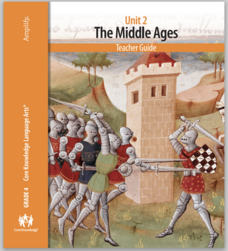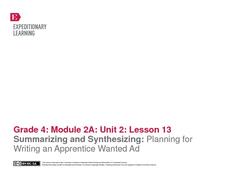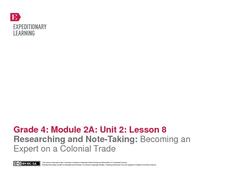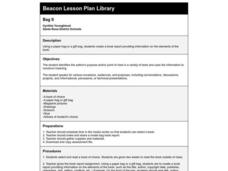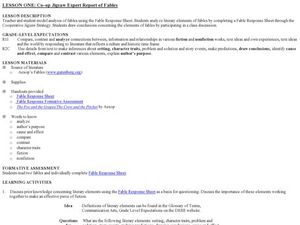EngageNY
End of Unit 2 Assessment: Working with Two Texts - Reading, Listening, Summarizing, and Synthesizing
As a summative assessment for this unit on colonial trade, fourth graders listen to and read informational texts in order to demonstrate their ability to take notes, write summaries, and draw connections. Young scholars first listen as...
Core Knowledge Foundation
Unit 2: The Middle Ages
Over four weeks, fourth graders read and discuss texts about the Middle Ages. They practice vocabulary, spelling, and grammar, such as nouns, adjectives, and verbs. Writing opportunities allow learners to boost their note-taking skills...
Curated OER
Using Details from Text to Identify Author's Purpose
Explore writing techniques by analyzing newspapers and magazines with middle schoolers. They will collaborate in small groups to read local news stories and identify the main ideas and author's intent. They also utilize an information...
University of Kansas
Newspaper in the Classroom
Newspapers aren't only for reading—they're for learning skills, too! A journalism unit provides three lessons each for primary, intermediate, and secondary grades. Lessons include objectives, materials, vocabulary, and procedure, and...
EngageNY
Summarizing and Synthesizing: Planning for Writing an Apprentice Wanted Ad
In instructional activity 13 of this unit on colonial trade, young researchers learn about apprentices as they prepare to write help-wanted ads for the specific trade they have been researching. To begin, the class listens closely as the...
EngageNY
Researching and Note-Taking: Becoming an Expert on a Colonial Trade
Fourth graders work in small groups to become experts on different colonial trades in the eighth instructional activity of this unit. Working toward the long-term goal of writing a piece of historical fiction, young scholars read...
Pennsylvania Department of Education
6 Traits: Word Choice
Pupils explore language arts by participating in a vocabulary usage activity. In this word choice lesson, students read examples of great word usage in literature and discuss with the class why some words appear stronger than others....
Curated OER
Making Connections: I Know Why Caged Birds Sing
Young scholars discuss equality and fairness by reading a Maya Angelo poem. In this U.S. history lesson, students read the poem I Know Why Caged Birds Sing, and discuss how the era it was written in affected the words. Young scholars...
Curated OER
Bag It
Students create a book report in a bag. They include items that explain the elements of the story and share them with the class.
Curated OER
What Makes a Cat a Cat?
Students investigate the lives of pets by videotaping them. In this animal life lesson, students videotape a cat and other pets using school cameras in a computer lab. Students review the footage from the cat and other animals and...
Curated OER
Cooperative Jigsaw Expert Report of Fables
Young scholars research literary elements of fables. In this literature lesson, students analyze literary elements of fables. Young scholars work collaboratively using a jigsaw strategy to analyze literary elements.
Other popular searches
- Persuasive Text Examples
- Persuasive Text Samples
- Persuasive Text Readings
- Identifying Persuasive Text
- Biased Persuasive Text
- Persuasive Text Writing
- Esl Lessons Persuasive Text
- Persuasive Text Lesson
- Persuasive Text and Writing
- Persuasive Text Lesson Plans
- Reading Persuasive Texts
- Non Fiction Persuasive Texts



